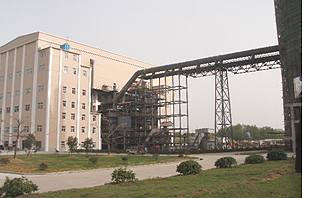Energy Efficient Production of Resources
To reduce CO2 emissions, it is necessary to pursue energy efficiency in the production of cement and other resources.
KHI has developed the CONCH Kawasaki Kiln (CKK) system, which integrates the cement production and waste treatment processes by installing a waste treatment plant next to a cement plant to facilitate the detoxification, reduction, and recycling of waste.
Since the CKK system can utilize the pyrolysis gas and ash from a waste treatment plant as a fuel and resource for the cement production process, it enables fuel consumption to be reduced by approximately 5% to 20%. As a result, this system can produce an annual reduction in global greenhouse gas emissions equivalent to 160,000 tons of CO2.
In addition, dioxins and other hazardous materials generated during the waste treatment process are detoxified at a high temperature during the cement firing process. This eliminates the need to have a special facility just for the treatment of hazardous materials, thereby reducing the construction costs to approximately one tenth of those required for a conventional waste treatment plant in Japan.
The superior environmental performance and energy-saving effects of the CKK system are well recognized, as evidenced by the system being nominated for the Blue Sky Award presented by UNIDO.
* United Nations Industrial Development Organization: A specialized United Nations agency that promotes industrial development through technical cooperation and other activities.

Panoramic view of the CKK system





